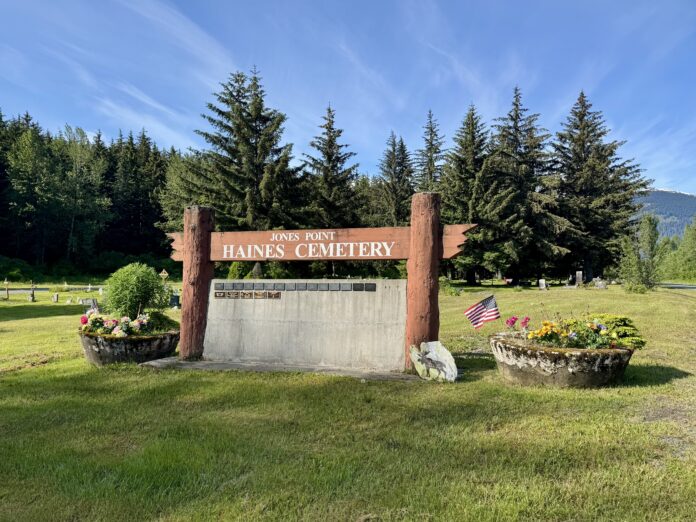A nonprofit group’s push to take over a a portion of Haines’ only community cemetery has ignited public backlash and raised questions about land use priorities, land deeds, ethics, and the sanctity of burial grounds in one of Alaska’s oldest towns.
The Takshanuk Watershed Council, a local environmental nonprofit, submitted a request to the Haines Borough for access to cemetery property in order to build a 7-foot-high electrified wildlife fence and allow the movement of heavy equipment for a planned industrial composting facility. The facility would be located directly adjacent to the historic Jones Point Cemetery.
The executive director of TWC, Derek Poinsette, who also serves on the Haines Borough Planning Commission, is seeking support from fellow commissioners at the Thursday meeting. If approved, the commission’s recommendation would advance the controversial request to the Haines Borough Assembly for a final decision.
Community members, including longtime volunteer cemetery caretakers, have expressed alarm at what they see as an inappropriate and potentially illegal intrusion onto land legally. deeded for cemetery use only.
The Jones Point Cemetery was established on land transferred by the federal government to the Town of Haines on Jan. 13, 1922. That deed contains strict usage limits and includes a reversionary clause that prevents the land from being used for any purpose other than cemetery operations.
“This partnership has worked very well for all these years since the local government has recognized and agreed that the cemetery land was deeded to the People of Haines… to be used as a cemetery only,” said Roc Ahrens, who along with his wife Diann, has helped manage the cemetery for nearly four decades. “We were shocked to learn that the nonprofit occupying the neighboring industrial parcels intended to encroach on the cemetery property when they have 50 acres available on their land.”
The composting easement application seeks to enclose a section of the cemetery property within a wildlife fence, effectively granting TWC exclusive access and control, violating the deed’s restrictions and diminish the solemn nature of the site.
Documents in the June 19 meeting packet indicate that the fence would take a section of the cemetery to facilitate industrial operations.
The composting facility is permitted under the zoning code on TWC’s own light-use industrial land. However, the cemetery lies in a rural mixed-use zone that requires a conditional use permit for any industrial activity. That process, which involves public notice and a hearing, has not been initiated, raising questions about whether the community even knows what the deed says regarding the cemetery and the far-reaching implications of the taking.
“This is a noisy, bear-attracting, odor-producing operation that requires the area — including cemetery property — to be fenced in with a 7-foot-high electric fence,” said Roc Ahrens.
Concerns are also being expressed about the planning process and shifting borough policies. Last fall, the TWC application was reviewed under the then-manager, who recommended its denial on Dec. 19, 2024. Following that recommendation, TWC withdrew the request. But after a third borough manager took office in this year, TWC resubmitted the application. This time, borough staff are recommending approval — despite no material changes in the proposal.
TWC, which brands itself as a watchdog on development and environmental issues, has drawn scrutiny before. In 2023, its executive director sent correspondence to FEMA that resulted in the loss of $1.4 million in disaster recovery funds for storm-damaged Porcupine Road. Poinsette justified the action by citing concerns over environmental impacts of the repairs.
The composting facility could have been located elsewhere on TWC’s extensive property holdings, minimizing any impact on the cemetery. Instead, the group wants even more land, and is willing to take whatever the city will allow.
With only about 500 burial plots left and a growing need for a columbarium, cemetery caretakers say the encroachment would disrupt their expansion plans and threaten a partnership between local government and volunteers that has served the community since the 1940s.
The Planning Commission is scheduled to deliberate and vote on the application on June 19. Their recommendation will then go to the Haines Borough Assembly, which has final authority on whether to approve or deny the controversial easement.
